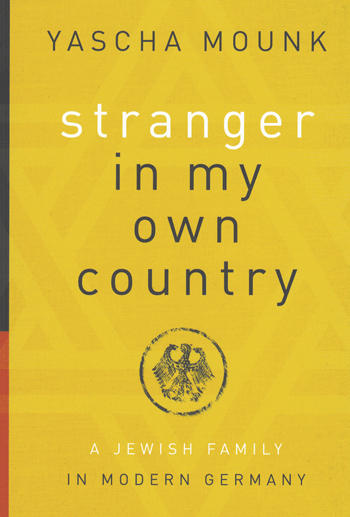Stranger in My Own Country: A Jewish Family in Modern Germany, by Yascha Mounk, Farrar, Strauss and Giroux, 261 pages, $26
Reviewed by NEAL GENDLER
German born and raised Yascha Mounk’s native language is the only one he speaks unaccented, but in Germany, he feels like a stranger.
Traditionally, he says, being German is a matter of bloodline, not birthplace, and many Germans consider people of other ethnicities to be immigrants, as was his Shoah-decimated family, forced to leave Communist Poland.
“As a German Jew, you don’t have to make a special effort to remember the past,” says Mounk, a writer and a Ph.D. candidate in political thought at Harvard. “The past, usually in manners most surreal, will find a way of imposing itself on you.” In addition, “there is a dark underbelly of lingering, even resurgent anti-Semitism.”
His problem wasn’t hatred or violence, he says, but the opposite: benevolence.

“Most Germans I met were so keen to prove they weren’t anti-Semitic that they treated me with the nervous niceness usually reserved for the mentally handicapped or the terminally ill.”
Such awkwardness — for both parties — is the entry for Mounk’s perceptive analysis of Germans’ conflicted attitudes toward the war and the Shoah, toward immigrants desperately needed to offset a decreasing population, and even toward foreign relations.
Stranger in My Own Country describes Germany’s evolving periods of thought: the postwar years of not discussing the Third Reich, as if 1945 was a “Zero Hour, insulating the past from the present”; the 1960s, when young people demanded to know what their parents and grandparents had done and worked to remake Germany; and most recently, as many Germans are saying “enough is enough” — they want to be done with guilt and just be a normal nation.
Mounk is quick to appreciate the progress that has made Germany Europe’s economic powerhouse, a solid Western democracy and a pretty good place to live — just one where even his unobservant Jewishness meant he didn’t fit. His story isn’t a personal whine, but an insightful analysis illustrated and enlivened by his experiences. It’s surprisingly engaging, easy and even entertaining reading for such a serious subject.
Mounk cites two dramatic changes: the ousting of conservative leadership in 1969 by former resistance fighter and socialist Willy Brandt, who shocked Germans — positively and negatively — by going to his knees in a silent act of contrition during a 1970 ceremony at a monument to the Warsaw Ghetto uprising; and the 1979 broadcast of a U.S.-made “Holocaust” television series, which, while controversial, “was perhaps the single most consequential event for Germany’s changing relationship toward its past.”
Now, the idea of putting the past behind “has become ever more respectable among the German establishment,” and younger academics, writers and filmmakers “are trying to make a name for themselves by refocusing the national debate on German victimhood.”
As if!
Pre-Shoah, “there was such a thing as a German Jew,” Mounk says. But despite the recent growth of the Jewish community in Germany, “there are Jews and then there are Germans. The two categories, in the German even more so than in the Jewish imagination, no longer overlap.”
Germany is experiencing “an intense backlash against immigration,” with particular hostility to several million Turks brought in as workers, he says. “The very idea that people of different ethnicities and cultural heritages could exist peacefully is increasingly coming under attack.”
Mounk quotes Prime Minister Angela Merkel’s telling a political group that the idea of “multiculturalism in our country… has failed, absolutely failed.” He says her message was that Turks shouldn’t be a separate group with their own language, food and customs, but should follow Germany’s “lead culture.”
“I simply do not feel German,” says Mounk, who embraces his most satisfying identity: that of New Yorker. Being different — or Jewish — is normal in New York, “the place where I can cease to be a German and cease to be a Jew and come to be at home.”
***
Neal Gendler is a Minneapolis writer and editor.
(American Jewish World, 1.31.14)



















